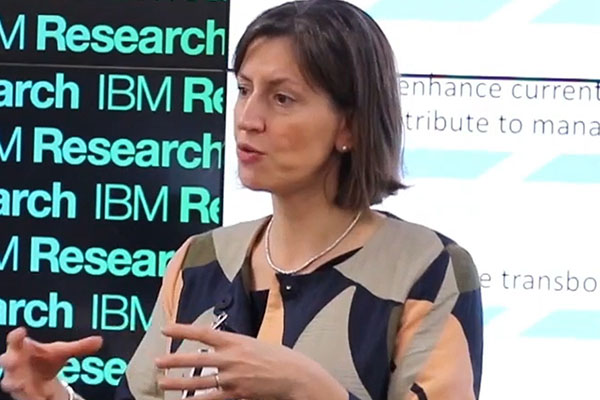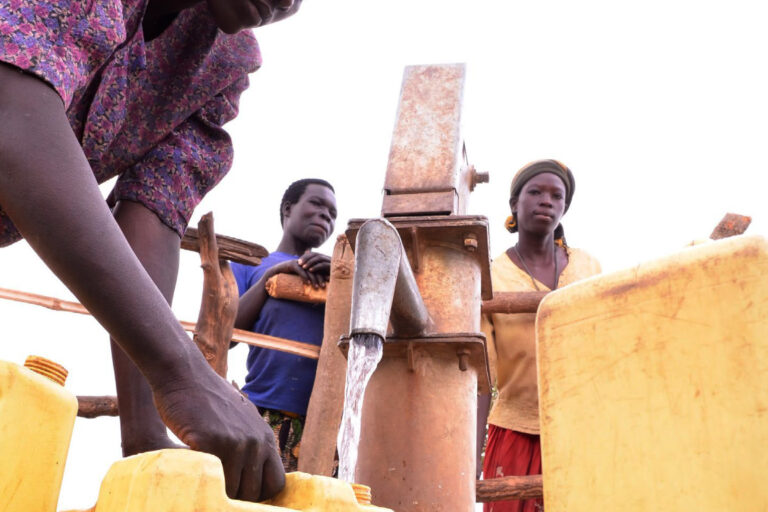
Translating Data into Action
SWP’s Clara Bocchino fosters collaboration between governments, research institutions and USAID on transboundary water management and big data in Southern Africa.
When Clara Bocchino began her undergraduate degree in Milan, studying foreign languages and literature, she thought she would go on to be an interpreter. But one class, a study in human geography, introduced her to community-based natural resource management – and changed her life.
“Transboundary conservation really captured my attention – the complexity of the problems,” she says. “I have a passion around sustainability. That’s always my starting point.”
Years later, that passion is what brought Bocchino to the Sustainable Water Partnership (SWP), USAID’s flagship water security project. She’s working in Pretoria, South Africa, managing the complex partnerships of SWP’s Big Data and Transboundary Water Collaboration in Southern Africa.
The program, which officially kicked off in the spring of 2018, has been a long time coming. “The collaboration started off very loosely,” Bocchino explains. For years, USAID, the South African Department of Science and Technology (DST), the Groundwater Management Institute of the Southern African Development Community (SADC-GMI), IBM Research Africa and the United States Geological Survey (USGS) had discussed using their complementary expertise to improve water security in the region. USAID asked SWP, implemented by Winrock International and a consortium of partners, to provide technical leadership and assist in the coordination
SWP stepped up to the plate. In August 2017, the partnership finally took shape during the Idea Jam event at IBM’s Johannesburg office. “All the partners got together and decided to sponsor some research on connecting the big data world and transboundary water research,” Bocchino says. Now, as project coordinator, Bocchino keeps the diverse group in sync and on target.
“There are several different partners who have different mandates and therefore different agendas, but they’ve decided to come together to begin talking about common issues,” Bocchino says. “It’s an interesting partnership because everybody still maintains their own institutional identity, whilst working towards common objectives for Southern Africa.”
The team primarily supports Southern African researchers and students: developing their skills, building their capacity and providing them with valuable networking opportunities. Long-term, the activity aims to establish a Community of Practice whose objectives are to find new ways to understand, manage, and collaborate around transboundary groundwater resources in Southern Africa.
“For USAID Water, the interest is related to the goals of SWP,” Bocchino says, “looking at the challenges and successes in distributing quality water, in rural areas as well as urban areas.”
But what sets this activity apart from others of its kind is the utilization of big data analytics.
Big data “can mean any data – numbers, words, maps,” Bocchino explains. “So long as you have a valid question, big data analytics can help you answer it through machine learning.” Partner IBM can provide the algorithms and analytics needed to provide answers – but as Bocchino puts it, “it’s all in the question, in what you want to know.”
“But the idea is that all of these projects need to be able to show impact on supporting decision-making and policy,” Bocchino says. “It’s not just about research for research’s sake.”
The partnership will support four research teams of domain experts and data scientists who will define and research the key questions surrounding transboundary water management in Southern Africa. The collaboration is now reviewing proposals for four research teams, each with a slightly different angle on transboundary water and data collection. They hope to contract the teams by the end of the year.
As it turns out, Bocchino is still using the skills that would have served her well as an interpreter in her work with SWP.
“I’m still making sure people talk to each other and find solutions to common problems,” she says. “I’m very happy that I’m at this place.”
Related Projects

